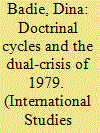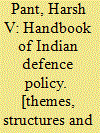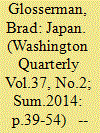| Srl | Item |
| 1 |
ID:
105240


|
|
|
|
|
| Publication |
2011.
|
| Summary/Abstract |
Though presidential doctrines claim to be broad, forward-looking articulations of national security principles, they are in fact reactive and narrow. They emerge following crises and can subsequently constrain security policy, creating ideal conditions for new crises to emerge. This paper thus argues that in the pursuit of security, presidential doctrines can perpetuate a cycle of instability. Using the Nixon Doctrine as the present case study reveals that the strategy first came as a response to the failure in Vietnam, then rendered the US unable to foresee or manage the events of 1979: the Iranian Revolution and the Soviet invasion of Afghanistan. These crises subsequently forced a wholesale reassessment of security in the form of the Carter Doctrine. In examining this period of US-Middle East relations, the constricting, reactive nature of doctrines and the concomitant cycles of instability become self-evident.
|
|
|
|
|
|
|
|
|
|
|
|
|
|
|
|
| 2 |
ID:
145818


|
|
|
|
|
| Publication |
New Delhi, Routledge, 2016.
|
| Description |
xvii, 426p.: ill.hbk
|
| Series |
Routledge India Handbooks
|
| Standard Number |
9781138639904
|
|
|
|
|
|
|
|
|
|
|
|
Copies: C:1/I:0,R:1,Q:0
Circulation
| Accession# | Call# | Current Location | Status | Policy | Location |
| 058703 | 355.4/PAN 058703 | Main | On Shelf | Reference books | |
|
|
|
|
| 3 |
ID:
087989


|
|
|
|
|
| Publication |
2009.
|
| Summary/Abstract |
India and Pakistan have now been nuclear powers for at least a decade, apparently already having "gone to the brink" several times. Despite the dire potentialities of nuclear exchange, both countries pursue very specific nuclear deterrent and response strategies. These strategies can be found in their doctrinal development, how they articulate that doctrine and affiliated "red lines," and deployment of nuclear weapons delivery means and associated systems (such as antiballistic missiles systems and satellites).
|
|
|
|
|
|
|
|
|
|
|
|
|
|
|
|
| 4 |
ID:
133159


|
|
|
|
|
| Publication |
2014.
|
| Summary/Abstract |
Japanese Prime Minister Abe Shinzo's goal is simple: end all doubts about his country's status as a first-tier nation. From inventing the Abenomics program, intended to spark an economic rejuvenation, to creating new security institutions as well as articulating new defense policies and doctrines, the Abe administration has focused on creating the conditions which would allow Japan to more forcefully assert and defend its national interests. Over a year into his first term, signs are good: the economy has rebounded; defense spending is up; Tokyo has pursued a new, aggressive diplomacy re-establishing its bona fides in the region and beyond; and the Japanese seem to be more optimistic about their prospects.
|
|
|
|
|
|
|
|
|
|
|
|
|
|
|
|